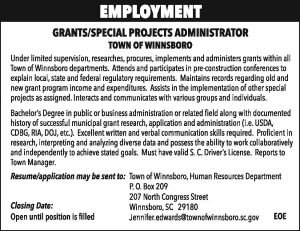Radioactive Pollutants in Jenkinsville Well
JENKINSVILLE – For the third time in four years, the Jenkinsville Water Company is bumping up against the S.C. Department of Health and Environmental Control (DHEC), this time for excessive radium and gross alpha contaminants in well number 15, on Clowney Road.
DHEC issued a Notice of Violation to the company on Aug. 19, stating that the Jenkinsville Water Company (JWC) had exceeded the maximum contaminant level (MCL) in well 15 during the monitoring period of July 2013 – January 2014. A chart accompanying the notice, however, indicates that the levels of radium and gross alpha outstripped their MCLs well into June of this year.
Gross alpha particles occur from the erosion of natural sediments in the soil, the MCL for which is 15 picocuries per liter (pCi/L – a measurement of radioactivity in water). Between July and September of 2013, the Clowney Road well’s gross alpha levels were 22.4 pCi/L. Between October and December of 2013, they were 24.7. Those numbers dipped in the first quarter of 2014 to 18.1 pCi/L, but spiked again to 23.7 pCi/L between April and June of 2014, for a one year average of 22 pCi/L – well above the 15 picocuries per liter limit.
DHEC’s MCL for combined Radium 226 and Radium 228, which also occur from soil erosion, is 5 pCi/L. Between July and September of 2013, the Clowney Road well’s MCL for radium was 6.5 pCi/L. That number jumped to 8.5 between October and December of 2013, and dropped off to 5.3 pCi/L in the first quarter of 2014. Between April and June of 2014, DHEC detected only Radium 228, but above the MCL at 6.5 pCi/L, bringing the JWC’s yearly average at well 15 to 7 picocuries per liter.
According to DHEC, “some people who drink water containing” the gross alpha or radium contaminants in excess of the MCL “over many years may have an increased risk of getting cancer.”
A DHEC spokesperson told The Voice Tuesday that “a public water system is not required to take a well out of service for violation of an MCL for a contaminant where the MCL level is based on long term exposure, but is encouraged by us to do so if the water system has enough excess capacity to meet demand.”
Violations are based on at least a year’s worth of data, DHEC said, and not a single sample result. The MCL for radium is based on 20 or more years of exposure, the spokesperson said, “and there is no immediate health threat from drinking water that has radium levels above the MCL.”
DHEC said the company has already met with the Drinking Water Enforcement Section to discuss the violation and possible course of action to return to compliance. JWC will be required to submit a corrective action plan (CAP) to DHEC for approval, the spokesperson said, which must have a proposed course of action to return to compliance with a schedule for implementation.
An Enforcement Conference was held last week, DHEC said, and a draft Consent Order (CO) has been prepared and reviewed. The draft CO, which specifies that the CAP must be submitted to DHEC within 30 days, was scheduled to be mailed to the JWC this week.
In August of 2012, the JWC was slapped with a $14,000 fine by DHEC for failure to issue a boil water advisory to customers within 24 hours of the July 2012 discovery of E-coli bacteria and total coliform in the system, as well as for failure to collect follow-up samples after the contaminants were discovered. The company made its last installment payment on that fine in June 2013.
In June of 2010, the JWC was issued a notice of violation when DHEC found that the MCL for uranium was exceeded in well number 10 at the Blair fire station for the monitoring period of July 2009 through June 2010. The MCL for uranium is 30 micrograms per liter. Between July 2009 and June 2010, well 10 averaged 33.4 micrograms per liter, with a high of 42.5 between April and June of 2010 and a low of 20.4 between October and December of 2009.
Phone calls to Gregrey Ginyard, president of the Jenkinsville Water Company, were not returned at press time.












